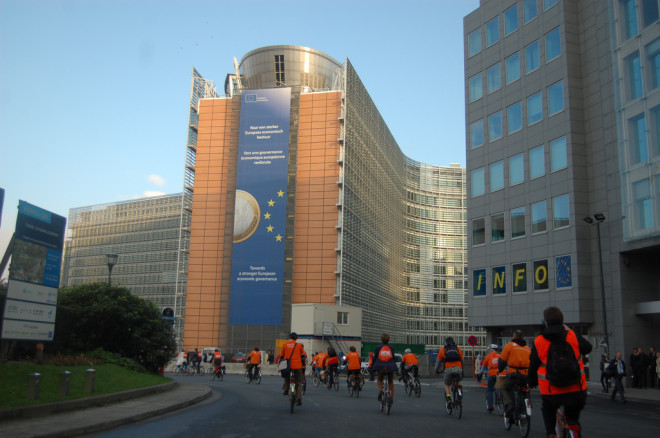
European Mobility Week: What's It All About?
Cyclists in front of the European Commission
Next week is European Mobility Week and cities are getting ready to flaunt their sustainable mobility credentials. But will it really make a difference?
What on earth is it all about?
“EU Mobility week is a time when European cities, big and small try to promote sustainable transport,” explains my colleague Martti Tulenheimo, ECF’s Urban Mobility Policy Officer.
“You’d be surprised by how many cities across Europe really get behind this initiative.”
According to the European Commission, over 2,000 cities (and some 227 million EU citizens) take part. And unsurprisingly, it’s a week where the bicycle is put firmly in the spotlight.
What’s your city doing?
We want to hear from your experiences at EU mobility Week. Send us an email, a tweet or post on our facebook page and tell us what you’re doing next week.
Be Creative
So how can you get yourself (and your bicycle) heard above all the noise? Perhaps the answer lies in creativity. Last year, ECF was wowed by some pretty zany ideas. Our Austrian members hosted a world-first “bicycle-marriage” ceremony.
As Europe’s capital closes its streets to cars this Sunday, another group will also be doing their part.
“Mad Bike Customisation” is a project which has teamed bike mechanics with professional designers to create truly beautiful bicycles out of recycled parts. They’re organizing a parade of ‘customised’ bicycles which kicks off at the capital's central station at 10am.
“We really want to show people in Brussels that bicycles are a really modern form of transport,” says Elise Peroi, a textile design student in Brussels who herself has customized a bicycle.
“Bikes can be sexy and just like you have a custom car parades, you can do the same with bicycles. I hope we manage to change a few opinions."

Bikes can be just as sexy, if not sexier than cars. Credit: Mad Bikes Customisation
Will It Last?
So do all these great things actually mean anything in the long-term? According to the European Commission, yes. Over 7,000 measures actually ended up remaining permanent, from street-closures to segregated bicycle lanes.
You'd be surprised how easy people warm up to the idea of fewer cars. Take Stockholm as an example: When local government introduced a congestion charge, 75% of voters were against it. A few months after the charge was put in place, 75% were in favour because they saw that it made there city nicer.
Let's see how many permanent changes come about in Europe this year...
Want to meet with ECF? If you happen to find yourself in Brussels next week, then drop in and say hello. We’ll be at the European Parliament on Tuesday September 18, from 9:00am to 4:30pm at the sustainable two wheels event.
 About the Author
About the Author
Julian Ferguson is the Communications Officer for the European Cyclists’ Federation. Originally hailing from Australia and a keen bicycle advocate, he plans one day to ride his bicycle from Brussels to Melbourne
Contact the author
Recent news!
Upcoming events
Contact Us
Avenue des Arts, 7-8
Postal address: Rue de la Charité, 22
1210 Brussels, Belgium










